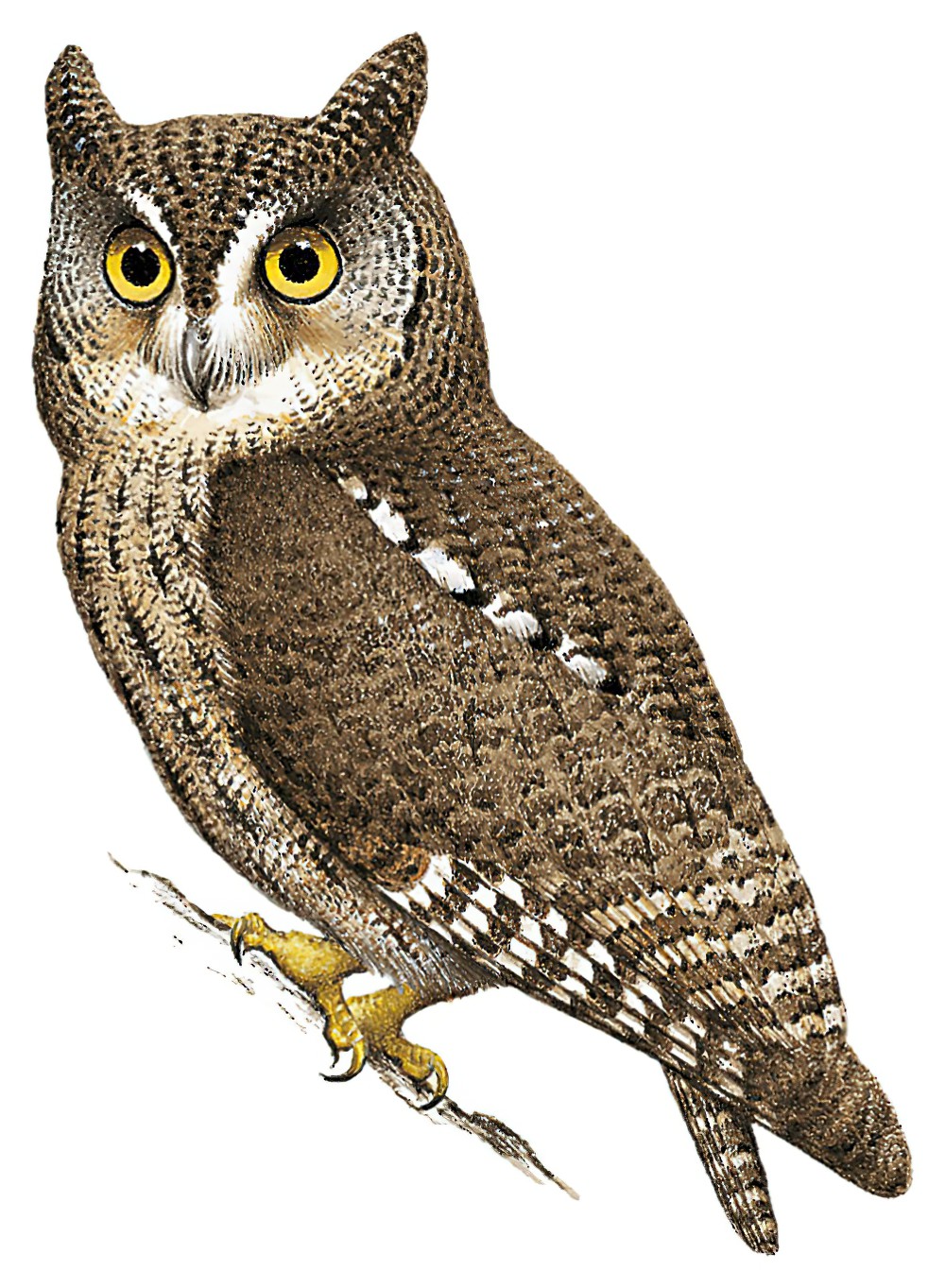Moluccan Scops-Owl / Otus magicus

Moluccan Scops-Owl
SCI Name:
Protonym: Strix magica Verh.Nat.Gesch.[Temminck] Land-Volk. pt4 p.110,note
Taxonomy: Strigiformes / Strigidae / Otus
Taxonomy Code: mosowl1
Type Locality: Amboina.
Author: Müller, S
Publish Year: 1841
IUCN Status:
DEFINITIONS
OTUS
(Strigidae; Ϯ Indian Scops Owl O. bakkamoena) L. otus small eared owl < Gr. ωτος ōtos eared owl; "III. OTUS BAKKAMOENA. The Little Horn Owl. THIS elegant species is found in Ceylon, is called there Bakkamoena, and is a scarce species even in that island. It is represented of its natural size. The irides are scarlet: the horns take their origin from the base of the bill, and point to the sides of the head: on their inner side they are dusky, on their exterior white. The bill is dusky, surrounded with long bristles: the circle of feathers round the eyes is of a very pale ash-color: the external circle of a yellowish brown. The head of a deep ash-color: the back dusky: coverts of the wings grey, marked with narrow lines of black, pointing downwards: the quil feathers regularly barred with black and white: the breast buff-colored, marked with small sagittal black spots: the legs feathered half way down: the naked part of a reddish yellow." (Pennant 1769); "Otus Pennant, Indian Zool., 1769, p. 3. Type, by monotypy, Otus bakkamoena Pennant." (Peters 1940, IV, 86).
Var. Otis.
Synon. Acnemis, Athenoptera, Ephialtes, Gymnoscops, Heteroscops, Lempijius, Pisorhina, Scops, Scototheres, Zorca.
otus
L. otus eared owl < Gr. ωτος ōtos eared owl; "42. STRIX. ... Otus. 4. S. capite auriculato pennis senis. Faun. svec. 47. Otus s. Asio. Bell. av. 25. 6. Aldr. orn. 1. 8. c. 3. Will. ornith. 64. t. 12. Raj. av. 25. Frisch. av. t. 99. Alb. av. 2.. p. 10. t. 10. Habitat in Europa. Cristæ auritæ albidæ fasciis sex fuscis." (Linnaeus 1758) (Asio).
magica / magicus
L. magicus mysterious < Gr. μαγικος magikos magical.
SUBSPECIES
Moluccan Scops-Owl (Moluccan)
SCI Name: Otus magicus [magicus Group]
OTUS
(Strigidae; Ϯ Indian Scops Owl O. bakkamoena) L. otus small eared owl < Gr. ωτος ōtos eared owl; "III. OTUS BAKKAMOENA. The Little Horn Owl. THIS elegant species is found in Ceylon, is called there Bakkamoena, and is a scarce species even in that island. It is represented of its natural size. The irides are scarlet: the horns take their origin from the base of the bill, and point to the sides of the head: on their inner side they are dusky, on their exterior white. The bill is dusky, surrounded with long bristles: the circle of feathers round the eyes is of a very pale ash-color: the external circle of a yellowish brown. The head of a deep ash-color: the back dusky: coverts of the wings grey, marked with narrow lines of black, pointing downwards: the quil feathers regularly barred with black and white: the breast buff-colored, marked with small sagittal black spots: the legs feathered half way down: the naked part of a reddish yellow." (Pennant 1769); "Otus Pennant, Indian Zool., 1769, p. 3. Type, by monotypy, Otus bakkamoena Pennant." (Peters 1940, IV, 86).
Var. Otis.
Synon. Acnemis, Athenoptera, Ephialtes, Gymnoscops, Heteroscops, Lempijius, Pisorhina, Scops, Scototheres, Zorca.
Moluccan Scops-Owl (Wetar)
SCI Name: Otus magicus tempestatis
tempestatis
L. tempestas, tempestatis tempest, storm < tempus, temporis time.
● "Wetter (Weeter or Weeta) is the largest of the islands visited. ... Mr. Kühn was very unlucky on Wetter. The drought caused scarcity of food and the dust was most disagreeable. The north side of the island could not possibly be visited, on account of the hostility of the head-hunters, who are very strong and indomitable and were not attacked by the smallpox. The first collection, made in April 1901, of 516 skins and 600 lepidoptera, was entirely lost in shipwreck, but the result of the second stay in September and October 1902 was similar as regards birds, though lepidoptera were then very scarce." (Hartert 1904) (Otus).
UPPERCASE: current genus
Uppercase first letter: generic synonym
● and ● See: generic homonyms
lowercase: species and subspecies
●: early names, variants, mispellings
‡: extinct
†: type species
Gr.: ancient Greek
L.: Latin
<: derived from
syn: synonym of
/: separates historical and modern geographic names
ex: based on
TL: type locality
OD: original diagnosis (genus) or original description (species)












